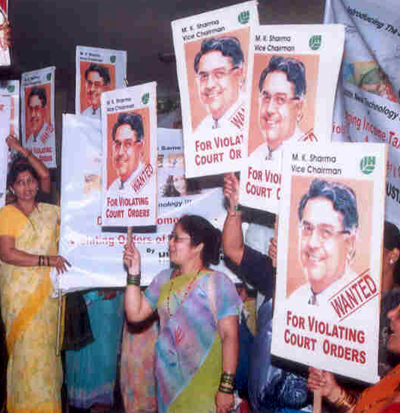Outlaw Conduct by Unilever Indian Subsidiary Prompts International Union Action at OECD
Posted to the IUF website 04-Oct-2006Share this article.

The Anglo-Dutch TNC Unilever is hardly a household word. Yet the company's 400 brands make it the third largest global food company (behind Nestl� and Kraft), the global market leader in detergents, and number three in soap and personal care products. Unilever has been operating in India since 1931, where its subsidiary Hindustan Lever Ltd. (HLL, speaking as 'Citizen Lever' on the company web site) vaunts its dedication to the highest standards of corporate behaviour towards our employees, consumers and the societies and world in which we live.
Workers at the company's Mumbai (Bombay) factory know the company better as a chronic violator of Indian law. HLL has been found guilty of unfair labour practices over a number of years by every court in the Indian legal system, including the Supreme Court of India. The company's ferocious determination to destroy the union representing the Bombay workers, the Hindustan Lever Employees Union, has not only resulted in repeated sanctioning by the courts. Contempt for court orders instructing it to rectify illegal labour practices brought criminal indictments this March against the Vice-Chairman and other senior managers, who are currently out on bail.

International Women's Day 2006 - union workers and family members rally for legal action against Hindustan Lever executives, 4 of whom are currently out on bail after being indicted for systematic violation of Indian labour law.
None of this has slowed down Citizen Lever. In a scenario worthy of a Bollywood potboiler, the company last year conspired to sell the factory in order to close it down, transfer production to Indian states offering more congenial taxes - and eliminate the union once and for all with a corporate vanishing act relieving it of its employer obligations.
On July 17, 2005 HLL transferred ownership of the Bombay factory to a company called Bon Limited. Bon Ltd. was represented in the deal by two fulltime employees of Hindustan Lever, responsible to HLL's M. K. Sharma - who represented Hindustan Lever in the sale.
HLL's sale of the Bombay factory was financed by a USD 2.17 million loan that Hindustan Lever provided to Bon Limited. The purchase price was 1.8 million. At the time of the sale, Bon Limited had a capitalization of only USD 10,800.
Bon Ltd. never possessed the necessary funds to operate the factory and maintain the employment of 900 union members. On July 26, 2006 Bon Limited's Managing Director sent a letter to all employees informing them "about the closure of the manufacturing activities at the Bombay Factory undertaking with immediate effect." In subsequent communications, employees were given until August 9 to accept a "voluntary" retirement offer.
There was one serious glitch in Unilever's scheme: Bon Limited couldn't close the factory and lay off the entire work force, because the factory wasn't theirs. The sale was in fact the subject of ongoing judicial review as the process had been challenged in the courts. Because the sale had not been legally accomplished, the proposed closure was illegal under Indian law.
The fraudulent sale of a production facility, financed entirely by Hindustan Lever Ltd., to a company which clearly lacked the minimum financial requirements for continued operation, and the illegal termination and closure procedures, not only constitute serious violations of Indian law. They are also major violations of the OECD's Guidelines for Multinational Enterprises, which require overseas subsidiaries to conform to national legislation throughout their operations.
Citizen Lever has therefore landed in the dock at the OECD. The IUF, on behalf of the Hindustan Lever Employees Union, has charged the parent company with egregious violations of the OECD Guidelines in India in submissions to the OECD National Contact Points in the Netherlands and the UK (the two OECD countries in which Unilever is incorporated). The action is intended to compel Citizen Lever to comply with national law and international standards and engage in the negotiations it has steadfastly resisted through a corporate crime spree stretching back nearly two decades.
The text of the IUF submission to the OECD is available on the IUF web site in pdf format by clicking here.
